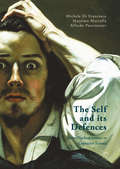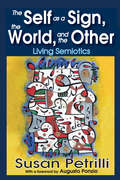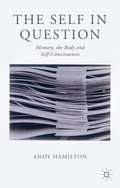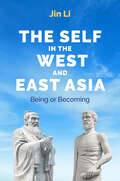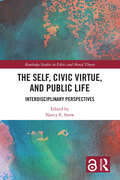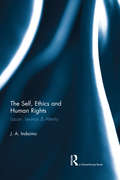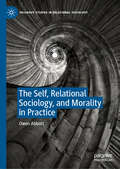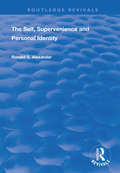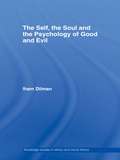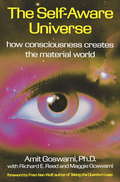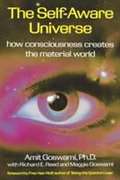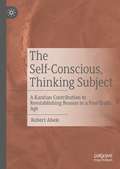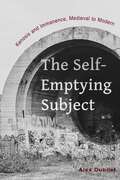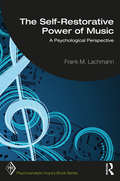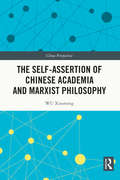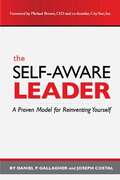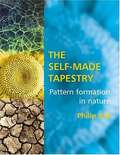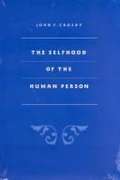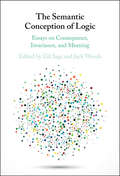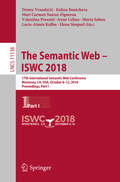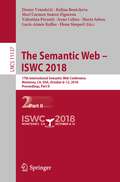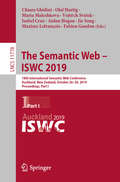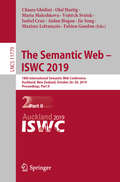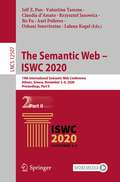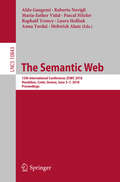- Table View
- List View
The Self and its Defenses: From Psychodynamics to Cognitive Science
by Massimo Marraffa Alfredo Paternoster Michele Di FrancescoThis book presents a theory of the self whose core principle is that the consciousness of the self is a process of self-representing that runs throughout our life. This process aims primarily at defending the self-conscious subject against the threat of its metaphysical inconsistence. In other words, the self is essentially a repertoire of psychological manoeuvres whose outcome is self-representation aimed at coping with the fundamental fragility of the human subject. This picture of the self differs from both the idealist and the eliminative approaches widely represented in contemporary discussion. Against the idealist approach, this book contends that rather than the self being primitive and logically prior, it is the result of a process of construction that originates in subpersonal unconscious processes. On the other hand, it also rejects the anti-realistic, eliminative argument that, from the non-primary, derivative nature of the self, infers its status as an illusory by-product of real neurobiological events, devoid of any explanatory role.
The Self as a Sign, the World, and the Other: Living Semiotics
by Susan PetrilliOstentation of the Subject is a practice that is asserting itself ever more in today's world. Consequently, criticism by philosophers, psychologists, sociologists, and anthropologists has been to little effect, considering that they are not immune to such practices themselves. The question of subjectivity concerns the close and the distant, the self and the other, the other from self and the other of self. It is thus connected to the question of the sign. It calls for a semiotic approach because the self is itself a sign; its very own relation with itself is a relation among signs. This book commits to developing a critique of subjectivity in terms of the material that the self is made of, that is, the material of signs.Susan Petrilli highlights the scholarship of Charles Peirce, Mikhail Bakhtin, Roland Barthes, Mary Boole, Jacques Derrida, Michael Foucault, Emmanuel Levinas, Claude Levi-Strauss, Maurice Merleau-Ponty, Charles Morris, Thomas Sebeok, Thomas Szasz, and Victoria Welby. Included are American and European theories and theorists, evidencing the relationships interconnecting American, Italian, French, and German scholarship.Petrilli covers topics from identity issues that are part of semiotic views, to the corporeal self as well as responsibility, reason, and freedom. Her book should be read by philosophers, semioticians, and other social scientists.
The Self in Question
by Andy HamiltonA humanistic account of self-consciousness and personal identity, and offering a structural parallel between the epistemology of memory and bodily awareness. It provides a much-needed rapprochement between Analytic and Phenomenological approaches, developing Wittgenstein's insights into "I"-as-subject and self-identification.
The Self in the West and East Asia: Being or Becoming
by Jin LiFrom the fraught world of geopolitics to business and the academy, it’s more vital than ever that Westerners and East Asians understand how each other thinks. As Jin Li shows in this groundbreaking work, the differences run deep. Li explores the philosophical origins of the concept of self in both cultures and synthesizes her findings with cutting-edge psychological research to reveal a fundamental contrast. Westerners tend to think of the self as being, as a stable entity fixed in time and place. East Asians think of the self as relational and embedded in a process of becoming. The differences show in our intellectual traditions, our vocabulary, and our grammar. They are even apparent in our politics: the West is more interested in individual rights and East Asians in collective wellbeing. Deepening global exchanges may lead to some blurring and even integration of these cultural tendencies, but research suggests that the basic self-models, rooted in long-standing philosophies, are likely to endure. The Self in the West and East Asia is an enriching and enlightening account of a crucial subject at a time when relations between East and West have moved center-stage in international affairs.
The Self, Civic Virtue, and Public Life: Interdisciplinary Perspectives (Routledge Studies in Ethics and Moral Theory)
by Nancy E. SnowThis volume showcases new and interesting ways in which the possession of civic virtues can contribute to people’s abilities to engage in public life in meaningful ways.What is the role of civic virtues in public life? How does possessing civic virtues affect persons and their capacities for participation in the public order? The chapters in this volume combine philosophical and empirically informed work to show how civic virtues can be informed by larger virtue ethical perspectives. The first two chapters discuss virtues of individuals that have not received significant empirical attention—authenticity and wisdom and psychological resilience. The next two chapters address education and the ways in which civic virtues can help us to better serve schoolchildren who are socially and economically disadvantaged, as well as to broaden students’ horizons with respect to character and sustainability education. The final four chapters explore the roles for virtues within various political and public realms. They offer perspectives on how virtues affect contentious politics in democratic societies, and study virtues in contexts in which democracy has been stifled or torn apart by war. Together, the chapters highlight the ever-widening impact of the virtues on our lives and in society.The Self, Civic Virtue, and Public Life will be of interest to scholars and graduate students working in ethics, political philosophy, psychology, and philosophy of education.The Open Access version of this book, available at www.taylorfrancis.com, has been made available under a Creative Commons Attribution-Non Commercial-No Derivatives (CC-BY-NC-ND) 4.0 International license.
The Self, Ethics & Human Rights
by Joseph IndaimoThis book explores how the notion of human identity informs the ethical goal of justice in human rights. Within the modern discourse of human rights, the issue of identity has been largely neglected. However, within this discourse lies a conceptualisation of identity that was derived from a particular liberal philosophy about the ‘true nature’ of the isolated, self-determining and rational individual. Rights are thus conceived as something that are owned by each independent self, and that guarantee the exercise of its autonomy. Critically engaging this subject of rights, this book considers how recent shifts in the concept of identity and, more specifically, the critical humanist notion of ‘the other’, provides a basis for re-imagining the foundation of contemporary human rights. Drawing on the work of Jacques Lacan and Emmanuel Levinas, an inter-subjectivity between self and other ‘always already’ marks human identity with an ethical openness. And, this book argues, it is in the shift away from the human self as a ‘sovereign individual’ that human rights have come to reflect a self-identity that is grounded in the potential of an irreducible concern for the other.
The Self, Relational Sociology, and Morality in Practice (Palgrave Studies in Relational Sociology)
by Owen AbbottProviding a theory of moral practice for a contemporary sociological audience, Owen Abbott shows that morality is a relational practice achieved by people in their everyday lives. He moves beyond old dualisms—society versus the individual, social structure versus agency, body versus mind—to offer a sociologically rigorous and coherent theory of the relational constitution of the self and moral practice, which is both shared and yet enacted from an individualized perspective. In so doing, The Self, Relational Sociology, and Morality in Practice not only offers an urgently needed account of moral practice and its integral role in the emergence of the self, but also examines morality itself within and through social relations and practices. Abbott’s conclusions will be of interest to social scientists and philosophers of morality, those working with pragmatic and interactionist approaches, and those involved with relational sociology and social theory.
The Self, Supervenience and Personal Identity (Routledge Revivals)
by Roland G. AlexanderFirst published in 1997, this volume addresses the issue of personal identity by examining the possibility that a person is ascribed identity on the basis of having a supervenient self. Ronald G. Alexander uses the methods of non-eidetic phenomenology and analytic ontology to argue that the self is supervenient on the physical and psychological properties of the human being. Understood through the manner Alexander advocates, the self is not a statis entity, but reflects the temporal nature of the person. Alexander argues that the self is the ‘pattern’, ‘character’, or ‘narrative identity’ that is the outcome of a person’s decision-making and actions.
The Self, the Soul and the Psychology of Good and Evil (Routledge Studies in Ethics and Moral Theory)
by Ilham DilmanThe way an individual's psychology is intertwined with their morality is the subject of this fascinating book from the pen of the late Ilham Dilman.Dilman convincingly argues that evil, though it cannot be reduced to psychological terms (it is a moral concept) is explicable in terms of an individual person's psychology. Goodness, by contrast, comes from the person and not their psychology.Philosophers the world over will want to read this book and see how Dilman skilfully defends his arguments.
The Self-Aware Universe
by Amit GoswamiConsciousness, not matter, is the ground of all existence, declares University of Oregon physicist Goswami, echoing the mystic sages of his native India. He holds that the universe is self-aware, and that consciousness creates the physical world.
The Self-Aware Universe: How Consciousness Creates the Material World
by Amit Goswami Richard E. Reed Maggie GoswamiBrings together the most recent discoveries in quantum physics and provides a powerful argument for transforming not only the way we view nature, but also how we view our own personal reality. This book challenges readers to give up their prejudices regarding material realism, to open ourselves up to the new language and new concepts that have paralleled the growth of quantum physics, and to accept the revelation that an object and the thought of an object are both products of consciousness.
The Self-Conscious, Thinking Subject: A Kantian Contribution to Reestablishing Reason in a Post-Truth Age
by Robert AbeleThis book argues that the primary function of human thinking in language is to make judgments, which are logical-normative connections of concepts. Robert Abele points out that this presupposes cognitive conditions that cannot be accounted for by empirical-linguistic analyses of language content or social conditions alone. Judgments rather assume both reason and a unified subject, and this requires recognition of a Kantian-type of transcendental dimension to them. Judgments are related to perception in that both are syntheses, defined as the unity of representations according to a rule/form. Perceptual syntheses are simultaneously pre-linguistic and proto-rational, and the understanding (Kant’s Verstand) makes these syntheses conceptually and thus self-consciously explicit. Abele concludes with a transcendental critique of postmodernism and what its deflationary view of ontological categories—such as the unified and reasoning subject—has done to political thinking. He presents an alternative that calls for a return to normativity and a recognition of reason, objectivity, and the universality of principles.
The Self-Emptying Subject: Kenosis and Immanence, Medieval to Modern
by Alex DubiletAgainst the two dominant ethical paradigms of continental philosophy–Emmanuel Levinas’s ethics of the Other and Michel Foucault’s ethics of self-cultivation—The Self-Emptying Subject theorizes an ethics of self-emptying, or kenosis, that reveals the immanence of an impersonal and dispossessed life “without a why.” Rather than aligning immanence with the enclosures of the subject, The Self-Emptying Subject engages the history of Christian mystical theology, modern philosophy, and contemporary theories of the subject to rethink immanence as what precedes and exceeds the very difference between the (human) self and the (divine) other, between the subject and transcendence. By arguing that transcendence operates and subjects life in secular no less than in religious domains, this book challenges the dominant distribution of concepts in contemporary theoretical discourse, which insists on associating transcendence exclusively with religion and theology and immanence exclusively with modern secularity and philosophy.The Self-Emptying Subject argues that it is important to resist framing the relationship between medieval theology and modern philosophy as a transition from the affirmation of divine transcendence to the establishment of autonomous subjects. Through an engagement with Meister Eckhart, G.W.F. Hegel, and Georges Bataille, it uncovers a medieval theological discourse that rejects the primacy of pious subjects and the transcendence of God (Eckhart); retrieves a modern philosophical discourse that critiques the creation of self-standing subjects through a speculative re-writing of the concepts of Christian theology (Hegel); and explores a discursive site that demonstrates the subjecting effects of transcendence across theological and philosophical operations and archives (Bataille). Taken together, these interpretations suggest that if we suspend the antagonistic relationship between theological and philosophical discourses, and decenter our periodizing assumptions and practices, we might encounter a yet unmapped theoretical fecundity of self-emptying that frees life from transcendent powers that incessantly subject it for their own ends.
The Self-Restorative Power of Music: A Psychological Perspective (Psychoanalytic Inquiry Book Series)
by Frank M. LachmannThis book explores how we can understand the place of music from a self psychological perspective, by investigating three journeys: the one we take when listening to music, the literal journey of the author from Nazi Germany to the United States, and the subjective round-trip between the past and the present. Drawing on the work of Heinz Kohut, the author examines how music can provide us with a way to reconnect with a sense of self, and how this can manifest in psychological and physical ways. There is particular reference to the work of Richard Wagner, Cole Porter, and Richard Strauss, and an examination of how their music enabled them, in times of stress and crisis, to restore and maintain a more positive sense of self. Finally, the book looks back at the author’s own experiences of music and the place of music in the Jewish world. With clinical excerpts, personal narrative, and sophisticated psychoanalytic insights, this book will appeal to all psychoanalysts wanting to understand the place of music in shaping the psyche, as well as music scholars wishing to gain a deeper appreciation of the psychology of music.
The Self-assertion of Chinese Academia and Marxist Philosophy (China Perspectives)
by WU XiaomingFrom a Marxist philosophical perspective, this collection of essays investigates the maturing self-consciousness and self-assertion of Chinese academia, especially within the humanities and social sciences, permitting more penetrating insights and critical engagement with the social reality of China.The author elaborates on the relationship between Hegel and Marx’s philosophy and their concepts of reality, thereby accounting for the historic and philosophical conditions for the autonomy of Chinese academia. Drawing on intellectual resources from both Eastern and Western archives, including phenomenology, philosophical hermeneutics, Western Marxism, and China’s pacifist tradition, the book refutes Huntington’s speculation about Chinese imperialism and delineates how China’s development can contribute to a fundamental critique of capitalist civilisation and a new paradigm of global governance. In addition, the book challenges the thinking of Chinese neo-liberals and nationalist-conservatives and their understandings of the history and social reality of China. Hence, the author advocates a reconstruction of the spiritual and intellectual realm within society based on Marxism, in order to counter Sinophobia, neo-liberalism, and nationalism at the same time.The book will appeal to readers interested in social and political philosophy, philosophy of history, Marxism, and China studies.
The Self-aware Leader: A Proven Model For Reinventing Yourself
by Daniel P. Gallagher Joseph CostalThe Self-Aware Leader provides practical and proven lessons on how becoming more self-aware within the context of your management practices will benefit you, your career, and your organization. Based on research by the author, it offers insights regarding those aspects of your management career about which you need to become self-aware, and which characteristics drive desirable leadership outcomes such as achieving success with projects, promotions, and professional satisfaction. Some of the specific topics discussed in The Self-Aware Leader include: defining the advantages of self-awareness in leadership specific lessons on how to become a self-aware leader guidance on how to successfully reinvent self, others, and the business applying your self-awareness to the task of day-to-day management the importance and value of profitable imagination in leadership how thinking like a general manager can yield benefits to you and your organization the power of Generosity QuotientTM and professional authenticity as leadership practices how to put these lessons together by “connecting the dots” to boost innovation and success. The Self-Aware Leader delivers a proven program to increased success for both you and your organization by outlining a path to greater managerial self-awareness. With its specific, experience-based insights for managers, The Self-Aware Leader is an extremely valuable resource for anyone interested in increasing their leadership skill set and furthering their managerial career.
The Self-made Tapestry: Pattern Formation in Nature
by Philip BallA revelatory exploration of nature's magnificent patterns and forms--and of their origins in simple physical law.
The Selfhood Of The Human Person
by John CrosbyWe often hear it said that "each person is unique and unrepeatable" or that "each person is his own end and not a mere instrumental means." But what exactly do these familiar sayings mean? What are they based on? How do we know they are true? <p><p> In this book, John F. Crosby answers these questions by unfolding the mystery of personal individuality or uniqueness, or as he calls it personal selfhood. He stands in the great tradition of Western philosophy and draws on Aquinas wherever possible, but he is also deeply indebted to more recent personalist philosophy, especially to the Christian personalism of Kierkegaard and Newman and to the phenomonology of Scheler and von Hildebrand. As a result, Crosby, in a manner deeply akin to the philosophical work of Karol Wojtyla, enriches the old with the new as he explores the structure of personal selfhood, offering many original contributions of his own. <p> Crosby sheds new light on the incommunicability and unrepeatability of each human person. He explores the subjectivity, or interiority, of persons as well as the much-discussed theme of their transcendence, giving particular attention to the transcendence achieved by persons in their moral existence. Finally he shows how we are led through the person to God, and he concludes with an original and properly philosophical approach to the image of God in each person. <p> Throughout his study, Crosby is careful not to take selfhood in an individualistic way. He shows how the "selfhood and solitude" of each person opens each to others, and how, far from interfering with interpersonal relations, it in fact renders them possible.
The Semantic Conception of Logic: Essays on Consequence, Invariance, and Meaning
by Gil Sagi Jack WoodsThis collection of new essays presents cutting-edge research on the semantic conception of logic, the invariance criteria of logicality, grammaticality, and logical truth. Contributors explore the history of the semantic tradition, starting with Tarski, and its historical applications, while central criticisms of the tradition, and especially the use of invariance criteria to explain logicality, are revisited by the original participants in that debate. Other essays discuss more recent criticism of the approach, and researchers from mathematics and linguistics weigh in on the role of the semantic tradition in their disciplines. This book will be invaluable to philosophers and logicians alike.
The Semantic Web – ISWC 2018: 17th International Semantic Web Conference, Monterey, CA, USA, October 8–12, 2018, Proceedings, Part I (Lecture Notes in Computer Science #11136)
by Valentina Presutti Elena Simperl Mari Carmen Suárez-Figueroa Marta Sabou Denny Vrandečić Kalina Bontcheva Irene Celino Lucie-Aimée KaffeeThe two-volume set LNCS 11136 and 11137 constitutes the refereed proceedings of the 17th International Semantic Web Conference, ISWC 2018, held in Monterey, USA, in October 2018. The ISWC conference is the premier international forum for the Semantic Web / Linked Data Community. The total of 62 full papers included in this volume was selected from 250 submissions. The conference is organized in three tracks: for the Research Track 39 full papers were selected from 164 submissions. The Resource Track contains 17 full papers, selected from 55 submissions; and the In-Use track features 6 full papers which were selected from 31 submissions to this track.
The Semantic Web – ISWC 2018: 17th International Semantic Web Conference, Monterey, CA, USA, October 8–12, 2018, Proceedings, Part II (Lecture Notes in Computer Science #11137)
by Valentina Presutti Elena Simperl Mari Carmen Suárez-Figueroa Marta Sabou Denny Vrandečić Kalina Bontcheva Irene Celino Lucie-Aimée KaffeeThe two-volume set LNCS 11136 and 11137 constitutes the refereed proceedings of the 17th International Semantic Web Conference, ISWC 2018, held in Monterey, USA, in October 2018. The ISWC conference is the premier international forum for the Semantic Web / Linked Data Community. The total of 62 full papers included in this volume was selected from 250 submissions. The conference is organized in three tracks: for the Research Track 39 full papers were selected from 164 submissions. The Resource Track contains 17 full papers, selected from 55 submissions; and the In-Use track features 6 full papers which were selected from 31 submissions to this track.Paper 'The SPAR Ontologies' is available open access under a Creative Commons Attribution 4.0 International License via link.springer.com.
The Semantic Web – ISWC 2019: 18th International Semantic Web Conference, Auckland, New Zealand, October 26–30, 2019, Proceedings, Part I (Lecture Notes in Computer Science #11778)
by Fabien Gandon Chiara Ghidini Olaf Hartig Maria Maleshkova Isabel Cruz Vojtěch Svátek Aidan Hogan Jie Song Maxime LefrançoisThe two-volume set of LNCS 11778 and 11779 constitutes the refereed proceedings of the 18th International Semantic Web Conference, ISWC 2019, held in Auckland, New Zealand, in October 2019. The ISWC conference is the premier international forum for the Semantic Web / Linked Data Community.The total of 74 full papers included in this volume was selected from 283 submissions. The conference is organized in three tracks: for the Research Track 42 full papers were selected from 194 submissions; the Resource Track contains 21 full papers, selected from 64 submissions; and the In-Use Track features 11 full papers which were selected from 25 submissions to this track.
The Semantic Web – ISWC 2019: 18th International Semantic Web Conference, Auckland, New Zealand, October 26–30, 2019, Proceedings, Part II (Lecture Notes in Computer Science #11779)
by Fabien Gandon Chiara Ghidini Olaf Hartig Maria Maleshkova Isabel Cruz Vojtěch Svátek Aidan Hogan Jie Song Maxime LefrançoisThe two-volume set of LNCS 11778 and 11779 constitutes the refereed proceedings of the 18th International Semantic Web Conference, ISWC 2019, held in Auckland, New Zealand, in October 2019. The ISWC conference is the premier international forum for the Semantic Web / Linked Data Community.The total of 74 full papers included in this volume was selected from 283 submissions. The conference is organized in three tracks: for the Research Track 42 full papers were selected from 194 submissions; the Resource Track contains 21 full papers, selected from 64 submissions; and the In-Use Track features 11 full papers which were selected from 25 submissions to this track.The chapter "The SEPSES knowledge graph: An integrated resource for cybersecurity" is open access under a CC BY 4.0 license at link.springer.com.
The Semantic Web – ISWC 2020: 19th International Semantic Web Conference, Athens, Greece, November 2–6, 2020, Proceedings, Part II (Lecture Notes in Computer Science #12507)
by Bo Fu Valentina Tamma Jeff Z. Pan Claudia D’Amato Krzysztof Janowicz Axel Polleres Oshani Seneviratne Lalana KagalThe two volume set LNCS 12506 and 12507 constitutes the proceedings of the 19th International Semantic Web Conference, ISWC 2020, which was planned to take place in Athens, Greece, during November 2-6, 2020. The conference changed to a virtual format due to the COVID-19 pandemic. The papers included in this volume deal with the latest advances in fundamental research, innovative technology, and applications of the Semantic Web, linked data, knowledge graphs, and knowledge processing on the Web. They were carefully reviewed and selected for inclusion in the proceedings as follows: Part I: Features 38 papers from the research track which were accepted from 170 submissions; Part II: Includes 22 papers from the resources track which were accepted from 71 submissions; and 21 papers in the in-use track, which had a total of 46 submissions.
The Semantic Web: 15th International Conference, ESWC 2018, Heraklion, Crete, Greece, June 3–7, 2018, Proceedings (Lecture Notes in Computer Science #10843)
by Anna Tordai Maria-Esther Vidal Aldo Gangemi Raphaël Troncy Pascal Hitzler Roberto Navigli Laura Hollink Mehwish AlamThis book constitutes the refereed proceedings of the 15th International Semantic Web Conference, ESWC 2018, held in Heraklion, Crete, Greece.The 48 revised full papers presented were carefully reviewed and selected from 179 submissions. The papers cover a large range of topics such as logical modelling and reasoning, natural language processing, databases and data storage and access, machine learning, distributed systems, information retrieval and data mining, social networks, and Web science and Web engineering.
